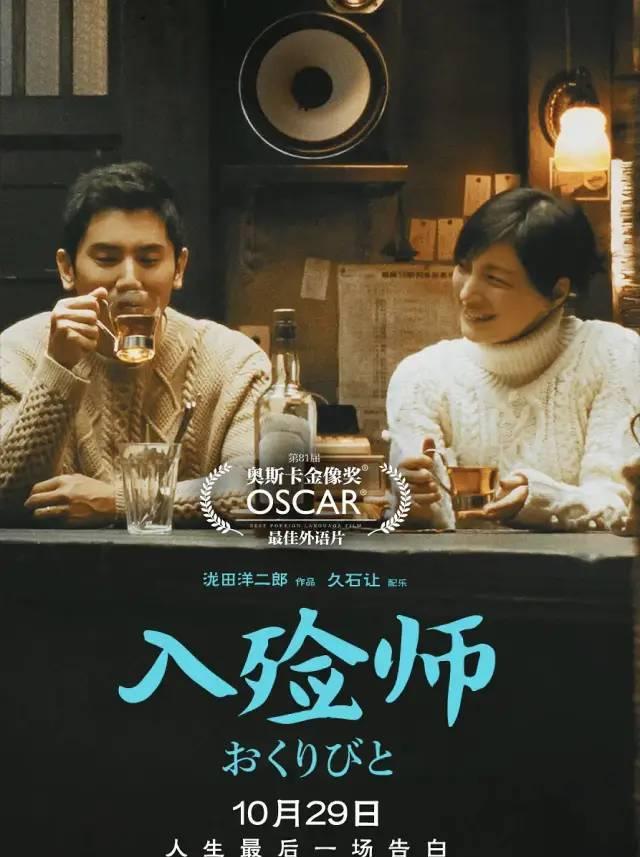Cover news reporter Zhou Qin
On October 29, the 4K restored version of the Oscar-winning work "Entering the Mortician" was screened nationwide. "The Mortician" has been touched and praised by the audience around the world, won dozens of awards at international film festivals, the film was released overseas in 2008, and it did not make it to the mainland big screen that year, and the introduction of this 4K restored version also made the majority of Chinese film fans lament that it was "an appointment spanning 13 years".

"Entering the Mortician" is a work with the characteristics of the Japanese nation's understanding of death, and watching this film more than ten years later, with the increase of age and different circumstances, many people seem to have new answers to questions such as "how to live seriously" and "how to digest death".
The film was directed by Yojiro Takita, scored by Jean Hisaishi, and starred Masahiro Motoki, Ryoko Hiromi, and Tsutomu Yamazaki. It tells the story of cellist Daigo Kobayashi who mistakenly stepped into the funeral profession. In the process of work, he has witnessed countless separations, from initial rejection to understanding and respect, and this special experience has become a compass for him to find the direction of life.
Living seriously and living in the moment may be the most direct feeling for the audience. Especially in the two years when the epidemic has become normal, the environment and industry around us, including everyone's state of mind, have undergone tremendous changes. Only living in the present and living seriously is the unchangeable truth to cope with change.
From the cellist to the mortician, the hand that used to play the violin has become the hand of the deceased, and the gap in the heart can be described as huge. If cellist Kobayashi lies in the "decency" of the past and does not change, the survival of the family may face problems. Choosing to cope with challenges and live a life that is misunderstood by the outside world but can support himself, Kobayashi's life has also ushered in great changes. He reconciles with the job, with his wife who doesn't understand his job, and with his father who abandoned him.
Those who live seriously, life will also be repaid with songs. In "The Mortician", there are many ordinary people who live seriously, the grandmother who has to close the bathhouse for the sake of the neighbors, the "gatekeeper" of the crematorium, and the president who said, "If you want to live, you must eat, and since you eat, you must eat the best"... Death is coming for everyone. And because of the serious love for life, there are fewer regrets, and the final serious farewell is more meaningful.
When collecting the coffin for the grandmother in the bathhouse, the scarf worn by the mortician for the grandmother is the "proof" that she also loved life in the last period of her life. When it came to the last journey, the "gatekeeper" of the crematorium said, "Death may be a door, and passing away is not the end, but transcendence, to the next journey." As a janitor, I have sent away many people here, saying that I will always see you again on the road", which is not only a farewell to my old friend's bathhouse grandmother, but also quite a bit of reincarnation.
In a long life, love and separation are not necessarily at odds. Even if you will eventually say goodbye, thinking that the future will eventually meet, your inner peace will be more than a point.
Director Yojiro Takita sketches the pile pieces with delicate brushstrokes, and the soundtrack master Hisaishi let the gentle music soothe all the difficulties. As the director wrote to fans, these things, which originated from real life, "contain infinite emotional tension under seemingly calm scenes."
Of course, some of the character settings in the film seem to be lagging behind today, more than a decade later. For example, the heroine who keeps a smile a lot of times, she is the "heroine" image of the typical Japanese virtuous wife, but her sense of existence outside of beauty is very weak. At present, when "her power" is awakened, in the context of many Japanese dramas that focus on women's growth, such as "Tokyo Women's Illustrated Book", "Black Leather Manual", "My Terrible Wife", "Kai's New Life" and so on, such traditional Japanese female characters can rely on their faces in the past to fight the world, but now there is less "value output".
But the flaws are not hidden. More than ten years later, watching "Entering the Mortician", many people still cry and red their eyes. After all, compared with the thin "often go home to see" and "live in the present", the power of literary and artistic works is attached to the character story, and it has the power to move people more. I knew we would eventually meet again, but until then, we had to live well, hug each other, and be with each other to live up to this life.
<b>[If you have a news thread, please report to us, once adopted, there is a fee reward.] Newspaper WeChat attention: ihxdsb, newspaper QQ: 3386405712].</b>